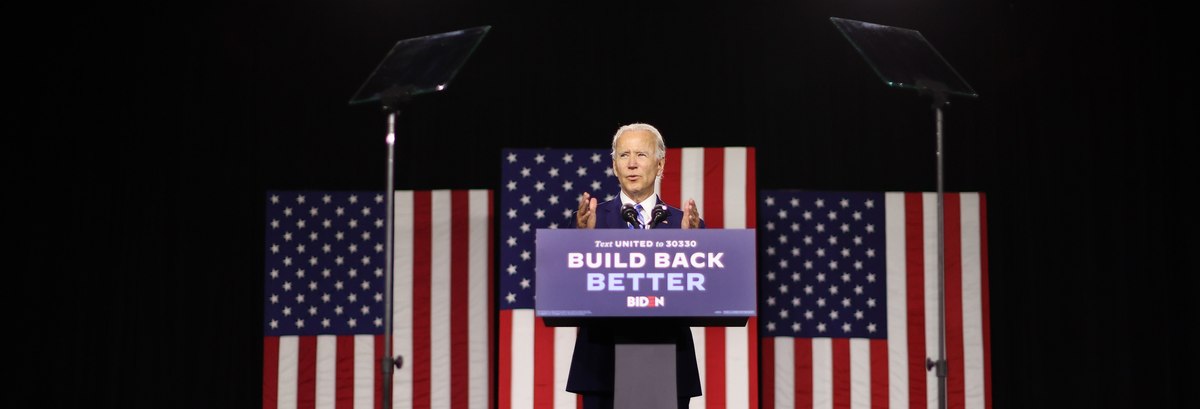This year, the COVID-19 pandemic has caused both Republicans and Democrats to change how they conduct their conventions. This Economist/YouGov Poll — which was conducted after the Democratic Party nominated former Vice President Joe Biden and while the GOP’s event to nominate President Donald Trump to a second term was beginning — finds Americans not completely convinced that the more virtual format is the way to go in the future.
Many registered voters didn’t find it interesting.
Biden supporters who watched the convention were content with the new format, finding it at least as interesting as more normal conventions. GOP viewers were almost uniformly negative. Two in five (41%) Biden voters also thought the 2020 format was better than previous convention formats. A strong majority (85%) rated the Democratic Convention as excellent or good, but only 13 percent of Trump supporters rated the Democratic Convention that well.
As for the ideal future convention, more than two in five Biden supporters (43%) would be happy to have future conventions have a split format, with part of the convention conducted virtually and part of the events in person. The rest are just as likely to be happy with a mostly virtual format (19%) as with a mostly in-person (19%) one. Those voting for President Trump are more insistent about having in-person conventions in the future.
Still, what Biden supporters found to be highlights of the convention were the convention speeches, and not any of the less traditional portions of the event.
Speeches by their nominees, by former First Lady Michelle Obama (and to a lesser extent, by her husband), and by 13-year old Brayden Harrington, who (like the young Biden himself did) stutters were cited often. Speeches outranked the less traditional portions of the conventions, like the actor-hosts, and the virtual roll-call of states (though these were both mentioned by a few).
Many Biden supporters saw nothing particularly wrong with the convention format, though a few cited its scriptedness, some awkward pauses, the jokes, and some of the speeches.
The Democratic convention highlighted the diversity within the Democratic Party. Nine in 10 Biden voters say it’s important to promote diversity in politics, and four in five believe the party does at least a fair job of doing this. Trump supporters are less likely to think this goal is important, though a majority (57%) agree that it is. But the increasing diversity in America is more divisive. Biden supporters (71%) are more than twice as likely as Trump voters (27%) to say that diversity makes the United States a better place to live.
As for the GOP participation in the Democratic Convention, with several former Republican officeholders speaking, that was okay with most Democrats. By 58 percent to 15 percent, they approve of Republicans speaking at the Convention. So do a quarter (26%) of Republicans.
Given the intensity of this political year, the relatively small percentage of undecided voters, and the close timing of both conventions, it may not be a surprise that this poll shows little evidence of a convention bounce for Biden in vote preference. He holds a nine-point lead over President Trump in this poll, not statistically different from the 10-point advantage he had last week, and the same as he held in previous polls this month.
There were also no measurable changes overall in favorable ratings of the candidates.
The conventions, however, have solidified some opinions. Attention to the campaign is up slightly, especially among supporters of the president (whose convention began during the polling period). But many assessments of the personal qualities of the presidential candidates have changed hardly at all.
Biden continues to maintain a clear lead over the president on honesty and caring about the public, and the two men are about equal when it comes to leadership. The Democrat’s supporters are feeling better about their lives, too. The percentage of Biden voters who say they are personally better off today than they were four years ago rose 13 points in the last week. But 85 percent of Biden supporters believe the country is worse off than it was then.
See the toplines and crosstabs from this week’s Economist/YouGov Poll
Methodology: The Economist survey was conducted by YouGov using a nationally representative sample of 1,500 U.S. adult citizens interviewed online between August 23 - 25, 2020. This sample was weighted according to gender, age, race, and education based on the American Community Survey, conducted by the US Bureau of the Census, as well as 2016 Presidential vote, registration status, geographic region, and news interest. Respondents were selected from YouGov’s opt-in panel to be representative of all US citizens. The margin of error is approximately 3.6% for the overall sample.
Image: Getty












